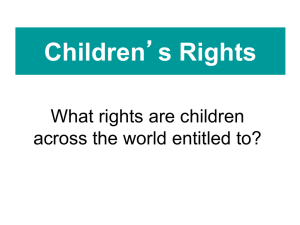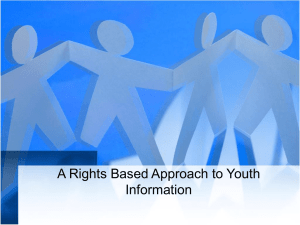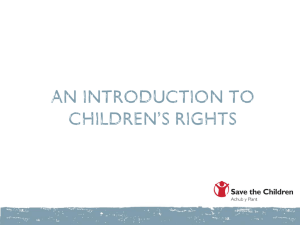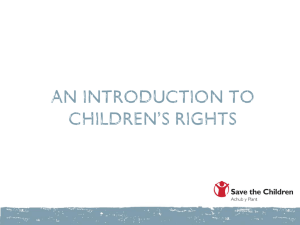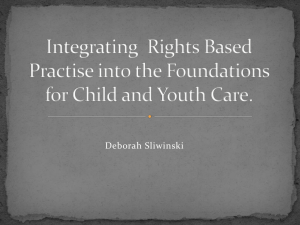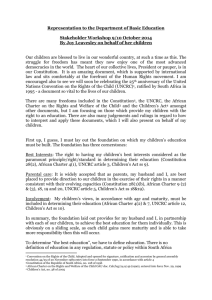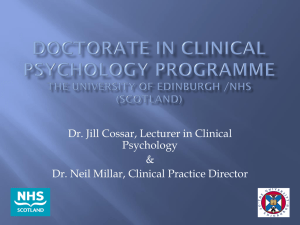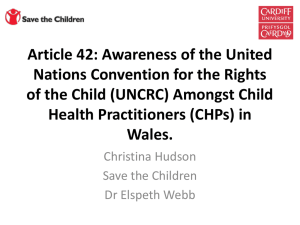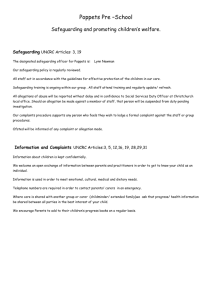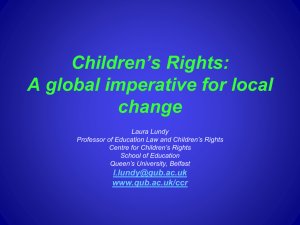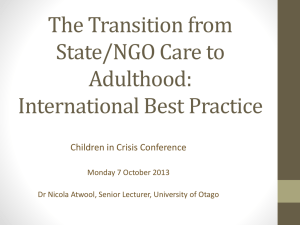The Rights of Children and Young People in State
advertisement
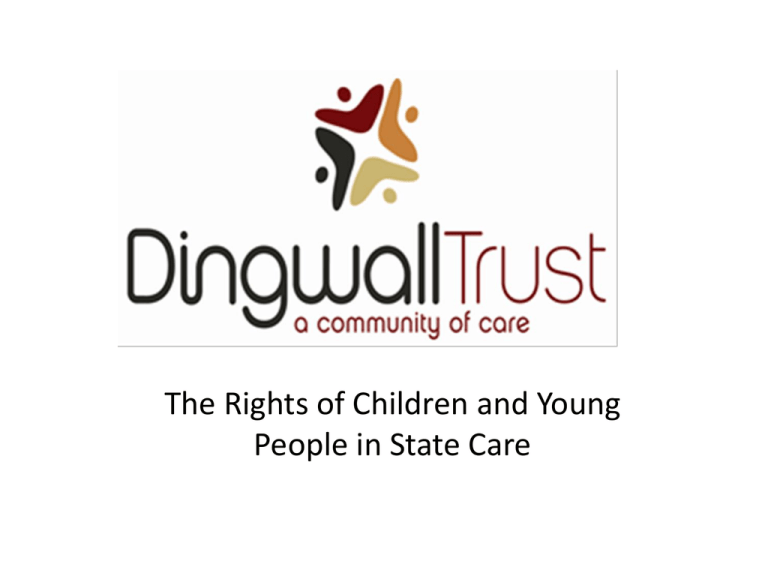
The Rights of Children and Young People in State Care Children and Young People in Care Placement Type F2013 as at 31 Mar 2013 CYF Caregiver Placement 1,344 Family / Whānau Placement 1,660 Child and Family Support Services* 519 CYF Family Home Placement 97 CYF Residential Placement 54 Other Placement Type** 162 National Total 3,836 Children’s Rights • United Nations Convention on the Rights of the Child (UNCRC) – NZ ratified in 1993 • State body responsibilities to ensure rights upheld under UNCRC • ‘Corporate parent’ responsibilities Care and Protection Legislation • UNCRC Article 1 defines anyone below the age of 18 years as a child. • CYPF Act 1989 – custody orders discharge on the 17th birthday of a young person • 17 year olds are “deemed too old to fall under the protective arm of our youth legislation, but too young to be appropriately assisted via adult legislation” (Boshier & Wademan, 2010, 294) Care and Protection Legislation • Guardianship orders can continue until a young person turns 20 • “The reach of the Act has been interpreted to exclude care arrangements from being made for people who have celebrated their seventeenth birthday” Judge Peter Boshier (Boshier and Wademan 2010, 299) Discharge from Care • Youngest age of discharge in the western world • Not even old enough to have finished high school • Young people in the general population are staying for longer periods of time within family environments • Vulnerable young people leaving care are expected to live independently and become fully functioning members of society at 17 years of age Issues for kids in care Comparative to the general population, young people in the care system have experienced • significant trauma, grief or loss in their lives; • have had less success within the education system; • have inadequate family/whanau networks or support; • have greater mental health problems; • less resilience to risk; • are less confident and significantly lacking in the skills required to live independently (Cashmore and Paxton 1996; Stein 2005). “The average age of leaving parental care in New Zealand is 23, so why does the care system relinquish all responsibility for us when legally we are not deemed adults? Why are we taken out of care when we cannot legally sign for papers such as tenancy, housing, bill payments, let alone vote? We don’t need the added stress. Picture your average teenager dealing with emotional, hormonal or physical changes to the body; with the added strain from school, exams, peer pressure all while trying to fit in and develop their own identities. The difference between this teenager and a teen in care, is that at age 17 your average teen is not expected to do this on their own. At 17 your average teen has emotional support from family. We do not. Financial support from family. We do not. Has a place to fall back on. We do not. We are alone. We’re alone.” Robin, 20 years Rights to Care and Protection • Article 3.2 outlines states responsibilities to ensure the child such care and protection as is necessary for his or her wellbeing • Article 6 - that a child who cannot remain with their family shall be entitled to special protection and assistance • In NZ we deprive children of care and protection once they reach their 17th birthday “What many young people leaving care don’t realise is that once your discharged you can’t go back. Most 17 years olds think of the freedom and liberties that come with being independent but fail to recognise the responsibilities and financial pressure of living independently. It escapes us whether we can feed ourselves, how we will make rent the next week, how we will afford to go the doctors and just how alone we can end up being.” Kellie, 20 years Education and Employment • Suddenly having to become responsible for all their own needs and living costs at 17 years old, whilst still at secondary school is a barrier to them recognising their right to education (Article 28) • This in turn affects their chances at better quality or meaningful employment. Care leavers pushed into poverty • Care leavers are often pushed into poverty, barely surviving if they wish to study and with high accommodation costs. • The Youth Payment along with an accommodation supplement often barely covers the cost of basic living, leaving no money for health needs, clothing or saving. Food Cost Survey 2013 Centre Diet type Auckland Basic Moderate Liberal Man 64 84 100 Woman 61 79 95 Adolescent Boy 82 107 128 Adolescent Girl 68 89 106 10 yr old 53 69 83 5 yr old 36 47 56 4 yr old 34 44 53 1 yr old 29 38 45 Department of Human Nutrition, University of Otago Adequate standard of living • The lack of money and capacity to provide the basics for themselves is a shock to a 17 year old leaving care who has had everything supplied for them in the past. • The lack of income along with difficulty in finding accommodation is a barrier to children leaving state care realising the right to an adequate standard of living (UNCRC Article 27). Access to Housing • Care leavers – no rental history and not seen as desirable tenants • At 17 not eligible for Housing New Zealand homes. Once 18, they are caught in the waiting lists. • For many costs of bond and rent in advance are too much, further limiting their options. • Work and Income support inadequate, pushes children into debt just to get into secure accommodation Housing Issues Lack of options lead to: • unsuitable domestic relationships maintained in order to gain shelter; • hostels or boarding houses alongside older homeless people with their own issues; • living on and working the streets to survive day to day • returning to abusive or unhealthy family situations. • Children pushed back into abusive situations just to have a roof over their heads, which is a violation of their right to freedom from all forms of violence (UNCRC Article 19). Rights to recovery and reintegration • Article 39 of UNCRC outlines that states should take appropriate measures to promote physical and psychological recovery and social reintegration to victims of abuse and neglect. • Sudden discharge, inadequate preparation for transition from care • Numerous studies overseas and in NZ identify difficult transition and poor outcomes for care leavers. Time in Care • A study by the Office of Children’s Commissioner in 2010 highlighted that 25.5% of the children interviewed had experienced between 4 – 6 placements and 22.2% had more than 6 placements • Being in care can be an incredibly isolating, especially when coming into care or moving placements means moving schools and communities as can often be the case. • “Shifting placements and locations on a regular basis strips us of the opportunity to make connections with friends and family, get involved in hobbies, to have consistent education and to develop a sense of belonging. It is so hard to develop social skills and to get to know someone well enough to trust them when we are moved often. We struggle to understand friendships and how they work. How do we learn to sustain relationships when the people around us always change? Tupua, 17 years Care System Limitations • Weighed down by bureaucratic procedures and requirements • Scarce resources for children in care • Notifications increased from 89,461 – 152,800 per year over last 5 years • Don’t have the resources to investigate that level of notifications and provide quality care “I saw my social worker once every three months, and this was because she had a court report due. During my three years in care, I had three different social workers of which only one I met face to face. The rest occurred in telephone conversations. There were also times where I did not have a social worker allocated to me, often for several consecutive months. No one knew me or my circumstances in the system, and thus they would not assist me in any way even though it was their job.” Kellie, 20 years Who monitors that rights are upheld? • Lack of stable relationships mean no trusted person to talk to when rights are not being upheld • Review of CYF complaints system 2013 – Only 2 complaints by children/young people since 2008 – Reasons include power imbalance; – They fear consequences of making a complaint; – Fear info can be stored and used against them later “When I was taken away from my loved ones I was never made aware of my rights. My right to privacy, my right to complain, my right to a voice, this made me feel powerless. When I was placed with my first caregivers with a plastic bag of my belongings I was told I was staying in a single bedroom with two other young people for two months. I did not know the caregivers, nor did I know who I would be sharing my space with. This made me feel disposable. No one asked me how I was feeling or what I thought about the situation. My right to an explanation was not upheld.” Samantha, 16 years Oversight of care system • Fragmented external oversight of care and protection system • None function effectively as regulator of full child protection system • Office of the Children’s Commissioner has an important role – not resourced or fully enabled to regulate full system • Recommendation to strengthen role and resourcing of OCC to include complaints advocacy, practice review, complaints review, children in care monitoring (Broad , 2013) Developing Policy and Legislation • Important to ensure a focus on human rights • Child Impact Assessments provide framework for exploring how policies and legislation will impact child’s rights • Amnesty International suggest a human rights committee be established to identify and resolve inconsistencies between bills and NZ human rights obligations Discrimination • UNCRC General Principle – Non-discrimination • Child removed from their family by the state is discriminated against as they do not receive the same care and support as expected of a reasonable parent • Rights under UNCRC not upheld
